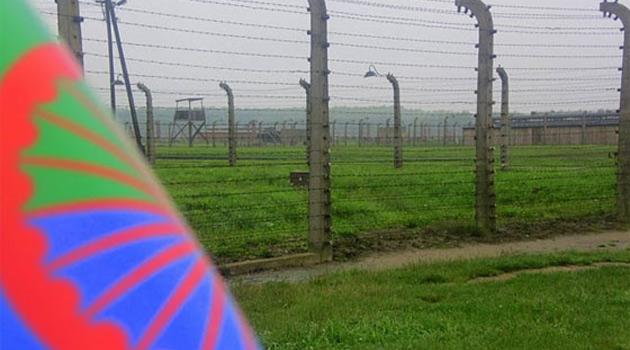Statement of the Alliance for the European Roma Institute on the 72nd Anniversary of the Romani Uprising in Auschwitz-Birkenau

Today, May 16, 2016, marks the 72nd anniversary of the uprising in the so-called
zigeunerlager, “Gypsy Camp,” in Auschwitz-Birkenau. On May 15, 1944, the SS
ordered the extermination of the 6,500 women, men and children imprisoned in the
zigeunerlager. On the evening of May 16, as the SS trucks surrounded the camp,
ordering its inhabitants outside, the Roma and Sinti prisoners refused to come
out of the barracks. With stones, work tools, sticks and crudely made weapons,
they fought off the SS guards. Such refusal, such resistance, was unprecedented;
after a tense face-off, the SS command was ordered to leave the camp and, for
the moment, its inhabitants were saved.
In 2010, La Voix des Rroms organized the first international commemorative
event connected to the May 16, 1944 uprising in the zigeunerlager in Auschwitz.
Since then, there has been an intensification in the emerging body of literature,
research, narratives, embodiments and artistic expressions connected to and
inspired by the events of May 16, 1944, and Romani Resistance Day is now
celebrated across Europe and across the world.
By commemorating the uprising, we remember and assert the importance of
Romani resistance, and the possibility of coming together to fight oppression
even under the most difficult moments, even in the face of mass murder, of
genocide.
Testimonies of Roma and non-Roma Holocaust survivors are key in keeping the
memory of Romani Resistance alive. Along with commemoration, Romani scholars,
artists, organizations and activists, alongside various non-Roma researchers and
institutions, have been carrying out new research on the uprising. The research
demonstrates how Romani resistance and survival strategies allowed for seeing
Roma in a new light, other than that of victim. Such survival strategies
preserve and maintain human dignity even in the most daunting circumstances.
The research documents history of escapes, the uprisings on May 16, 1944 and
August 2, 1944; it explores the memory of Roma heroes and the non-Roma
supporters of the Roma resistance movement as well as the active and heroic
participation of Roma people in the partisan movements around Europe under the
National Socialist regime. In this process of re-learning Roma resistance
emerges as an inspiring model for Roma knowledge, agency and consciousness.
In this immersive unlearning and rewriting of Roma history, we can mark a
number of ways in which we can replace a history of oppression with such
practices, moments and histories of resistance. Key to this unlearning is the
reconceptualization of Roma resistance as Roma perseverance, throughout history
into the present, in fighting the different forms of oppression.
Such resistance and perseverance is marked through assemblies, actions, and
other (political and cultural) events enacted by Romani people across different
countries. In particular, contemporary artists have been emphasizing the
embodiments and narratives of Romani resistance as a central aspect of the Roma
experience. Roma art itself is even seen as a measured and creative method of
Roma resistance, a well-established form of cultural survival and a
demonstration of ethical and political commitment to the future of the Roma
community.
On May 16, 2016, we engage in the commemoration activities around Europe to
celebrate the importance of the May 16, 1944 uprising in the zigeunerlager. We
take up the lessons this history teaches us, of Roma taking an active and
conscious role in shaping their lives and defining their own faith both during
the Holocaust and in its aftermath. On this day we celebrate the power of Roma
coming together and the alliances that can be built for Roma self-determination.
*The Alliance for the European Roma Institute is a coalition of Roma civil
society organizations, activists, scholars and artists. The Alliance is the
driving force in making the Institute a reality, with the support of the Council
of Europe and the Open Society Foundations.
The Alliance for the European Roma Institute:
Katalin Barsony, Executive Director of Romedia Foundation, CEO BAXT Films,
Myagunya Fellow of the Victorian College of the Arts at the University of
Melbourne
William Bila, Board member of the Roma Education Fund
Nicoleta Bitu, Director of Centre for Romani Studies in Bucharest
Ethel Brooks, Professor of Women’s and Gender Studies and Sociology, Rutgers
University and Member, US Holocaust Memorial Council
Timea Junghaus, curator, reseracher and art historian at the Hungarian Academy
of Science
Sead Kazanxhiu, artist
Angéla Kóczé, Visiting Assistant Professor Women’s, Gender, and Sexuality
Studies, Wake Forest University
Saimir Mile, lawyer and expert of Romani language
Andrzej Mirga, Chair of the Board of Roma Education Fund
Anna Mirga-Kruszelnicka, anthropologist, PhD candidate at the Autonomous
University in Barcelona
Ciprian Necula, Roma activist, associated professor to SNSPA Bucharest
Dijana Pavlovic, actor and producer
Nadir Redzepi, Executive Director of the Roma Education Fund
Romani Rose, head of the German Council of Sinti and Roma
Iulius Rostas, Visiting Lecturer at Corvinus University and Fellow of Institute
for Advanced Studies, Central European University
Mihaela Zatreanu, National Program Officer – ROMACT, Romania